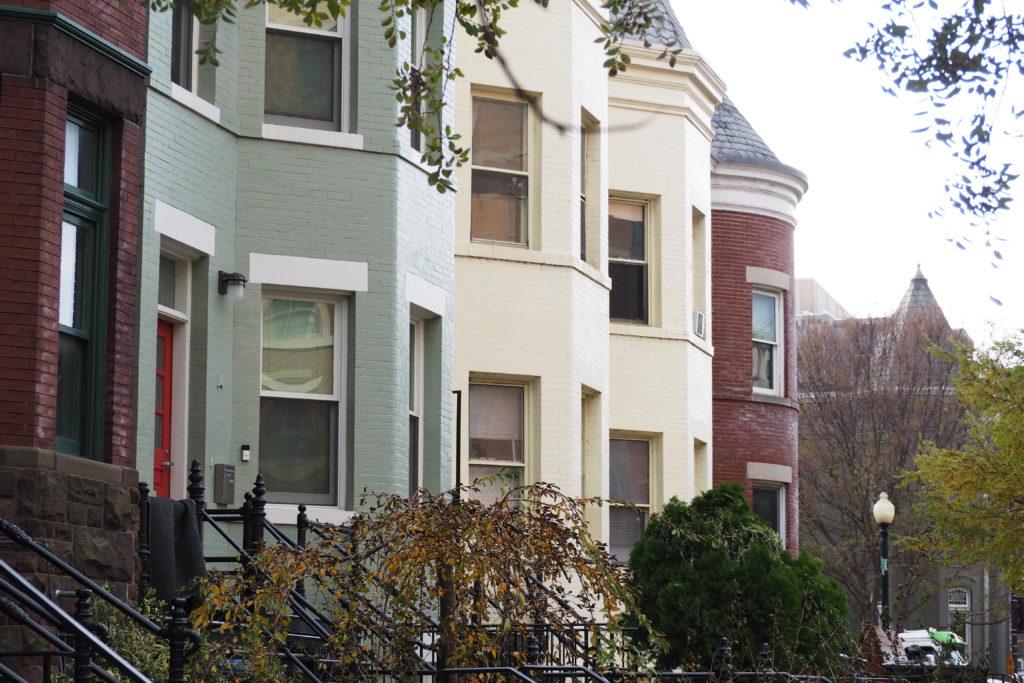Updated: Nov. 26, 2019 at 3:44 p.m.
Three years after the University added affordable housing units to campus, the homes are still filled with tenants.
Officials converted seven townhouses on F Street into one-, two- and three-bedroom affordable housing units in 2016 as an amenity in the DC Zoning Commission approval to build Square 75, which previously held townhouses and restaurants and is now 2112 Pennsylvania Ave. Property management officials said the majority of tenants in the units are either the first or second group of residents to live in the townhouses.
University spokeswoman Crystal Nosal said the University added the affordable housing units in 2016 for residents earning up to 80 percent of the average median income in the District.
A single tenant’s income cannot exceed $68,000 – 80 percent of the area median income for the D.C. metropolitan area – to be eligible for assistance under the Neighborhood Stabilization Program in 2019, while a family of two’s income cannot exceed about $77,680 to be eligible, according to Department of Housing and Urban Development guidelines. The income limit for a family of four is about $97,000, HUD guidelines state.
“GW hired Nest D.C. to market and lease the apartments in accordance with District Housing and Community Development requirements,” Nosal said in an email. “Nest is trained and certified to process such leases per DHCD standards and works closely with DHCD on the application process.”
She said officials are not planning to add more affordable housing units on campus in the near future but are instead focusing on improving student housing. Construction on Thurston Hall’s renovation is slated to begin at the end of the academic year.
“While no specific feedback from tenants has been shared to Nest or the University, the project was commended several times during its initial creation for both creating multi-room affordable housing apartments, which are not as common in D.C., and also contributing to the overall inventory of affordable housing,” Nosal said.
Arnetta Talley, a 73-year-old U.S. Navy Department retiree who moved into a one-bedroom affordable unit last November, said the low-rate housing has allowed her to set aside between $100 and $200 per month for emergencies since she moved to Foggy Bottom from California a year ago.
“When I moved from California, I had to leave everything behind, and I am building everything up and that is where my income is going right now,” Talley said.
She said her son, who lives in North Carolina, arranged for her to move back to D.C. after living in California for 20 years. She said her son helped finance the furniture she needed to move into the new place, but she’s covered the rest of her housing expenses.
“He took care of everything here and sent things to me, and all I had to do was sign the papers,” she said.
Kelly Cureton, a 35-year-old tenant living in one of the F Street homes, said she moved from Southeast D.C. with her teenage son in 2017 and has lived in the space since. She said that despite the rent price, she works at a print and ship warehouse to pay bills.
“That’s why I just got a job because though it is affordable, you still have to have money to pay things like bills,” she said.
Cureton said she and her son have enjoyed living on GW’s campus because he’s had opportunities to attend GW basketball games and meet several of GW’s basketball players.
“It’s just so many different opportunities,” she said. “For instance, he can look out the window and see the college students across the street and know that he has a future to go to college because he wants to go to college as well.”
Lydia La Motta – the assistant director of on-boarding at Nest D.C., which the University hired to market the space to potential tenants – said the company manages day-to-day marketing for housing units, including affordable housing, in the D.C. area and facilitates tours for potential tenants.
Nest D.C. markets the on-campus affordable housing units on specific websites like Social Serve – a non-profit bilingual call center that connects individuals with housing options and second-chance employment – Zillow and Hot Pads, La Motta said.
She said each F Street unit currently houses either the original set of tenants or the second round of residents.
La Motta said Nest D.C. typically has trouble finding couples that meet the affordable housing income criteria because the District income cap for two people is only about $10,000 more than the requirement for someone living alone.
Nest D.C. receives inquiries from students because of F Street’s prominent location on campus, but student loans and support from family members eliminate undergraduate students from living in these buildings, she said.
“For a single person, the affordability makes sense,” La Motta said. “But as you add another adult onto your household, you are only allowed to add about 10 grand to your maximum income, and so it makes it really hard for families to make enough money but still pay the rent.”
Parth Kotak and Lia DeGroot contributed reporting.
This post was updated to correct the following:
The Hatchet reported that the townhouses were built as part of GW’s negotiation with the city to demolish and reconstruct Rice Hall. The townhouses were converted as an amenity in the DC Zoning Commission’s 2016 approval. We regret this error.





